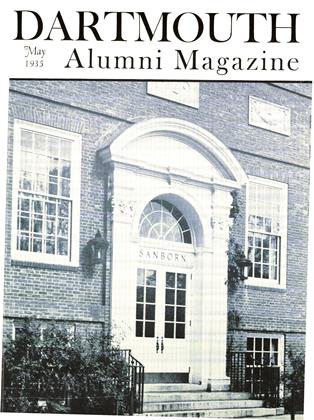By Boynton Mer-rill '15. Harper rill '15. Harper Brothers, New York City.
This book of sermons is the twenty-ninth in Harpers Monthly Pulpit Series, which presents each month a famous American preacher. Though among the youngest of the twenty-nine this distinguished son of Dartmouth takes his rightful place.
It has been said that a good sermon should be ten per cent reason and ninety per cent emotion. If this be true the general observation is proved by the exceptions. This preacher is an exception and all the sermons are exceptions. Each sermon is a rational word that finds the bull's-eye, but it does not hit it like a cabbage that "spreads and splurges over the whole target," but"as with a beam of light." Sermons of such character not only give joy in the reading but leave a lasting satisfaction.
The reader will be specially pleased to discover that he is reading religious and not newspaper sermons; that here is a preacher and not a dilettante roamer over fields not his own; that he is not blind to sin, adultery, or the Ten Commandments in full; and beyond this his clear religious insight sees, "No inevitable limitations of human nature." He sees greatness for those who will achieve it, despite all the supposedly limitating environmental influences or those philosophies which seek to reduce men to something relative or material.
A book of sermons should present variety. Here is to be found practically ten different "Arrows of Light"—One yet many. There are didactic, expository, seasonal, mystic, and for College readers one Baccalaureate Address. One special note from this latter is timely: "Petty poses and specious sophistries must go." A new mind that distinguishes between the temporal and the eternal is the distinct call of this day.
Happy, carefully selected, pointed illustrations abound, yet the preacher does not lose his real art in the art of illustrating. The material chosen illustrates but does not take the attention of the reader from the message.
It is doubtless true that most of us today rarely read a written sermon—and there is justification for this attitude considering. . . . . Here is one worth-while.
 View Full Issue
View Full Issue
More From This Issue
-
 Article
ArticleHANOVER BROWSING
May 1935 By Herbert F. West '22 -
 Article
ArticleHANOVER SUBMERGED
May 1935 By Richard J. Lougee '27 -
 Class Notes
Class NotesClass of 1918
May 1935 By Allan C. Gottschaldt -
 Class Notes
Class NotesClass of 1930
May 1935 By Albert I. Dickerson -
 Class Notes
Class NotesClass of 1904
May 1935 By David S. Austin, II -
 Class Notes
Class NotesClass of 1905
May 1935 By Arthur E. McClary
William H. Wood
-
 Books
BooksJesus and His Bible.
JANUARY, 1927 By William H. Wood -
 Books
BooksRELIGION AND COLLEGE
January, 1930 By William H. Wood -
 Books
BooksTHE MYSTERY OF THE APOSTLES
October 1935 By William H. Wood -
 Books
BooksREALIZING JESUS AND OTHER SERMONS.
October 1936 By William H. Wood -
 Books
BooksCHARACTER
January 1939 By William H. Wood
Books
-
 Books
BooksALUMNI PUBLICATIONS
November, 1025 -
 Books
BooksFaculty Articles
December 1945 -
 Books
BooksAn Archivist Looks
February 1946 -
 Books
BooksTHE EDUCATION OF YOUTH AS CITIZENS
July 1947 By Herbert F. West '22 -
 Books
BooksApril Without Fear
March 1980 By Robert H. Ross ’38 -
 Books
BooksREFORMER IN MODERN CHINA CHANG CHIEN
DECEMBER 1965 By WING-TSIT CHAN

